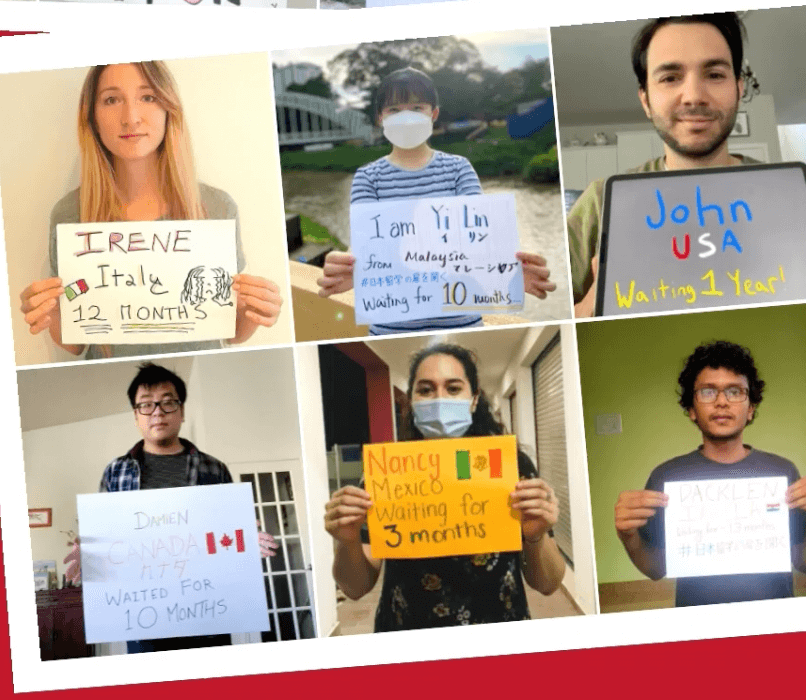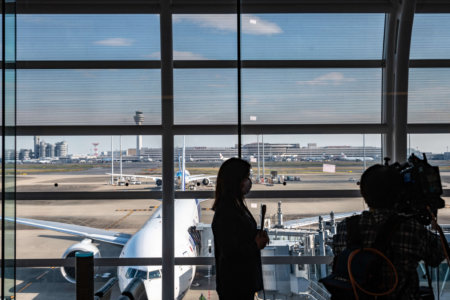
Travel bans and restrictions have left many international students locked out of the Land of the Rising Sun in despair. Many are eagerly waiting for the latest news in Japan regarding their ability to return to the country and swiftly to resume their studies.
Japan previously announced that they will begin accepting foreign nationals coming to the country for business trips and international students from November 8, but the new Omicron COVID-19 strain has led to a new ban taking place.
Since the beginning of the pandemic, such stranded students have faced challenges with communicating with their respective Japanese universities, time zone differences and remote classes. With the added burden of the new Omicron variant, it’s possible that Japan won’t reopen its borders to international students until next year.
Davide Rossi, from Italy, arrived in Japan 13 years ago as an international student himself at Yoshida Nihongo Gakuin. A year later, he founded his own company there. Today, he’s the executive director of Open the borders to safe study in Japan Association that helps support international students and workers stranded outside Japan.
His association aims to provide students with the latest news in Japan and public relations support activities concerning the immigration of international students. We catch up with Rossi via Zoom to speak about his thoughts on Japan’s current travel restrictions, his liaison with government officials and politicians, and his plan of action:
Waiting almost 2 years to reunite with my partner and have a chance to continue my life and studies in Japan . @kishida230 @MofaJapan_en @rossi_davide #LoveIsNotTourism #Educationisnottourism #workisnittourism
Japan needs to end this madness!! #JapanTravelBan pic.twitter.com/UX9qlt8AG1— タニア ( Tania ) 🎶🇵🇹🇯🇵🇬🇧 (@Tania_EDA) October 15, 2021
How did your story in Japan begin?
I’ve been living here for about 13 years now and I’ve even started a business — Go! Go! Nihon — to help students come live in Japan. This company, under Go Go World, is a free service that also helps foreigners study in countries like South Korea and Spain.
As you can imagine, I’m in touch with a lot of students. Just in July this year, there are about 170,000 stranded students waiting to re-enter Japan. What made things worse though, is that the country is still open to Japanese citizens and travellers that can still go abroad and come back — not to mention travellers from the Olympics in Tokyo.
I have Japanese friends who just went to Italy for a holiday and are on their way back soon. It’s crazy how people outside don’t know the extent of how illogical this all is.
Day 523
So much time LOST#japantravelban #開国しなさいニッポン #japanentryban #Educationisnottourism#opentheborderstostudents#日本留学の扉を開く pic.twitter.com/1tkVe6ucaU— Nele // ネール (@Yetska) December 6, 2021
The latest news in Japan hasn’t explicitly focused on international students. What’s new with the situation with students stranded outside of Japan?
A person with a long-term visa who has been waiting for a long time still can’t enter. The government thinks it’s fine to block foreigners but let Japanese citizens in because they’re worried about bringing the virus into the country.
However, COVID-19 doesn’t discriminate against different races or passports. Not only do students pay high tuition fees along with dealing with remote studies in different time zones, but they’re also not getting the on-campus and cultural experiences they paid for.

Rossi also also lead a online campaign on Twitter (#japantravelban) where stranded students hold up a sign with how long they have been waiting, their name and their nationality. Source: Davide Rossi
This is the reason why people are prepared to study Japanese and learn about the culture, to immerse themselves in a new environment. The students who are willing to follow necessary procedures, feel like their investment in time and money are not worth it.
Currently, the latest news in Japan portrays the message that foreigners are responsible for spreading COVID-19.
What about the government and foreign officials in Japan? Are they doing enough?
In my opinion, no. On one hand, you’ve got the Japanese government who are clearly blaming the foreigners, and on the other hand, you’ve got the foreign government officials who are not raising their voices. I don’t understand why.
South Korea, right now, has become a popular student destination because it’s open to students and is a better choice, especially for Westerners. The one issue is that they don’t recognise foreign vaccines so the rules have become stricter — if you don’t have a vaccine certificate, you can’t enter restaurants and places in the country.
(1/9) We are submitting the attached requests to the Ministry of Education & other politicians that listened us in the past about the borders.#japantravelban #educationisnottourism #日本留学の扉を開く #無駄にした青春を返せ #開国しなさいニッポン @mextjapan @konotarogomame pic.twitter.com/irxijT6lXh
— Davide Rossi – educationisnottourism.com (@rossi_davide) December 6, 2021
They made this rule last week because the cases are rising and it’s become a big deal. This led to the embassies there to protest — I’ve seen it on social media where they have posted about raising the issue of foreign vaccines to be recognised by the Korean government. These are steps that are being taken.
In response to your question, no. Government officials and foreign ones in Japan are not doing enough.
Are unis and educational institutions giving stranded students the support they need?
Language schools in Japan have been badly affected as their pupils are all foreigners. These institutions are actively making groups and sending requests to the Ministry of Education, the government and politicians.
As I’m close with the schools, I collect the student surveys. We know that 80% of the students would cancel their courses if they can’t enter the country next year.
We have a line of communication with the government but it seems like the people at the very top are thinking only foreigners can bring the virus into the country. The latest news in Japan states that 80% of the population is vaccinated and nearly zero deaths.
The situation is under control but the travel ban is still in place. With unis, it’s a different story altogether as most of their attendees are local.
What’s happening with unis now, is that they’re telling students since they can’t attend orientation, online classes will begin next year.
Message from the Ministry of Education to the international students who have been looking forward to studying in Japan.https://t.co/rVrpSE3RNJ
We have been asking MEXT for a public message. Hopefully they’ll keep communicating.#japantravelban #Educationisnottourism— Davide Rossi – educationisnottourism.com (@rossi_davide) December 8, 2021
Students don’t even have the chance to choose to do online classes as some unis are just giving up. Having said that, there are some that have been actively involved in trying to help their stranded students.
A few of these stranded students have gotten to a point where they want to organise protests in front of the embassies which, in Japan, has to be done carefully.
Have there been any student protests to return to Japan so far?
We have done some online events and petitions to raise awareness of the situation of students. About 10,000 people attended our events which were done during the Tokyo Olympics.
We also had an online photo event where we had stranded students hold up a sign with how long they have been waiting, their name and their nationality — that was really touching.
There’s not enough media coverage on this and the latest news in Japan still bears the message that the Japanese government is doing all they can to keep everyone safe. Student stories and details need to be shared more widely.
What other steps are you taking to help the international students who are stranded outside of Japan?
So, on Monday (Dec 6), we submitted a request to the government asking them to give students a roadmap as soon as possible on when they can enter and follow policies similar to other countries.
This is what embassies do. And stop saying “we have no power on this” while you attend another party. The current situation is terrible. You should try as hard as you can, it’s your job.@EUinJapan @CanEmbJapan @ACSTokyo @usembassytokyo @UKinJapan @IndianEmbTokyo @AustraliaInJPN pic.twitter.com/Vsm7ycErZn
— Davide Rossi – educationisnottourism.com (@rossi_davide) December 8, 2021
Do you have any advice for students stranded outside of Japan?
It depends on each individual case. There are students who feel like they have no choice left since they’ve invested so much in the country.
I would suggest working on a backup plan and distracting your mind. Stop checking the news for travel updates every morning if this is causing you a lot of distress and take up a hobby or learn something new.
It’s sad to hear but, eventually, Japan will open up one day and until then you can’t set your expectations high.
If you’re a student stranded outside Japan and you need help or information, you can reach out to Rossi on Twitter.










